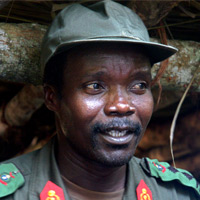
Current Situation
As leader of the Lord’s Resistance Army, or LRA, Joseph Kony is responsible for systematic crimes against humanity. Over a 20 year period, the LRA has abducted some 60,000 Ugandans, displaced
nearly two million people, and murdered, raped, or mutilated thousands of civilians. After years of relentless violence, a peace process has finally given hope to millions of victims. However, a thorny issue remains—how to deal with Joseph Kony. The Ugandan government and the LRA agree on the need for accountability, but they don’t agree on how, precisely, Kony and his henchmen will be held accountable for their crimes. Kony himself has made it clear that he will not submit to any process that treats him like a criminal or terrorist. The Juba peace talks have been put on hold for the past three months while the LRA and Ugandan Government consult and plan their next steps.
The time to strike a deal is now. Kony should be pressed to choose from three options, presented in conjunction with credible consequences for failing to take advantage of this opportunity:
- Accountability: If Kony decides to return to northern Uganda, he must face serious domestic justice mechanisms that meet international standards and local needs, such as prosecution in a special tribunal;
- Asylum: In the interests of peace and to allow northern Uganda to finally awake from the twenty year nightmare of LRA terror, an exile scenario that relocates Kony to another country may be the best solution; or
- Arrest: A coordinated regional strategy to apprehend Kony should the peace talks collapse is necessary both as contingency planning and as negotiating leverage.
Leadership from both the U.S. and the European Union (EU) is needed, particularly if a UN Security Council local accountability package falls short of the ICC’s standards or if asylum becomes necessary. Both the U.S. and the EU could also provide useful intelligence and logistical support for attempts to arrest Kony if necessary, and sustained U.S. involvement could introduce the requisite assurances for both the Ugandan government and Kony to credibly move the peace process forward.
Key Players
Joseph Kony and the LRA: The Lord’s Resistance Army, or LRA, is an exceedingly violent mystical movement led by self-proclaimed messiah Joseph Kony. It is notorious for its extreme brutality against Acholi populations in northern Uganda—including murder, torture, mutilations, rape, and child abductions. Finding a credible way to deal with Kony remains the key to peace in northern Uganda.
Ugandan Government: Since President Yoweri Museveni and his National Resistance Movement took power in 1986, several rebel movements have risen in the economically and socially marginalized north of the country. The Lord’s Resistance Army (LRA) continues to fight the government, although its political objectives remain poorly defined. Museveni has tried to solve the LRA problem by using military means but these efforts have sparked more intense and violent attacks by the LRA and dramatically increased the number of internally displaced people. The government and the LRA have been taking part in the Juba peace talks, but mistrust remains high.
The people of northern Uganda: With estimations of the LRA’s abduction of 60,000 northerners—many of them children—the north has a clear interest in bringing Kony to justice. Additionally, 1.5 million people from the region remain internally displaced. A recent study by the Berkeley-Tulane Initiative found 70% of northern Ugandans to be in favor of holding accountable those responsible for grave human rights abuses.
International Criminal Court (ICC): The ICC has issued arrest warrants against five top LRA commanders, including Kony and his deputy commander, Vincent Otti. These indictments helped to bring the LRA to the negotiating table.
Sudan: During the civil war between the Sudanese government in Khartoum and the rebel Southern People’s Liberation Army, Khartoum supported the LRA, driven in part by a desire to retaliate against the Ugandan government for its support of the SPLA. Negotiations to end Sudan’s 21-year civil war between the government and southern rebels led to a reduction in tensions between Uganda and Sudan in 2003, which allowed Ugandan army troops to pursue the LRA into Sudan. Sudan is also hosting the peace talks between the LRA and the Ugandan government in Juba, South Sudan.
United States: The U.S. took an important first step in shoring up U.S. engagement to end the conflict by naming Tim Shortley the Special Advisor on African Conflicts, with a particular emphasis on northern Uganda.
European Union (EU): the EU—working with the U.S.—can help provide the Ugandan Government with a series of carrots and sticks throughout its negotiations with Kony and the LRA leadership. Sustained EU and U.S. involvement is critical to maintaining credibility and forward movement on the peace talks.

